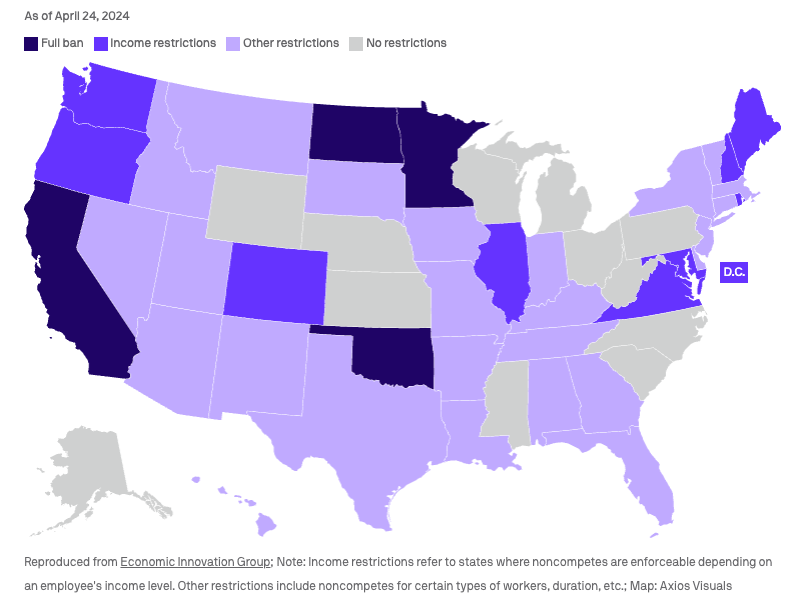The US Federal Trade Commission voted in April to ban noncompete agreements for American employers. The rule will take effect 120 days after publication in the Federal Register, which falls around September 2024 at the very soonest.
“Noncompete agreements were already illegal in several states such as California,” said Myriam Le Cannellier, Executive Director of DSML Executive Search (an Alexander Hughes company). “But we have already been advising our clients about the differences within the US.”
The establishment of an NCA ban may throw a wrench into the plans of European subsidiaries in the USA. For those expecting to hire new executives in the US, it may be time to revisit recruitment laws, onboarding paperwork, and hiring negotiations.
What Are Noncompete Agreements?
Noncompete agreements are legally enforceable contracts designed to stop employees from competing against a business once the employment period ends. This includes working with competitor companies or opening a business with a similar angle or industry.
In the US, noncompete laws were traditionally controlled at the state level. Four states — including California, North Dakota, Oklahoma, and Minnesota — have full bans on noncompete agreements. An additional nine states, including the District of Columbia, restrict noncompete agreements based on employee income levels.
Another 50% of US states impose various restrictions on noncompetes. That leaves just 24% of the US, including states like North Carolina and Michigan, without any restrictions on noncompete agreements.
But with the passing of the FTC ban in April 2024, all US states must eliminate noncompetes. This means European subsidiaries expanding to the US must prepare for a future without enforceable NCAs.
What to Know About the Noncompete Ban
If the FTC’s noncompete ban passes unchallenged, European subsidiaries must adapt to new employment laws.
So what expectations will your organization need to follow?
Here are the details at a glance:
- All US businesses, including subsidiaries of European companies expanding to the US, would be banned from creating noncompetes or employment agreements that prevent employees from joining similar businesses (or launching their own).
- Any employer discovering an illegal noncompete agreement may report the infraction to noncompete@ftc.gov.
- Being that most of our clients are senior executives (classified as policy-making employees earning more than $151,164 per year) they are an exception to the rule. If there are existing NDAs or NCAs already in place for already contracted senior executives, then the FTC assumes prior negotiation and does not expect employers to renegotiate existing agreements. That said, employers cannot create or enforce new NDAs with their senior executives or policy-makers.
- There is no legislation against nondisclosure agreements, more commonly known as NDAs. Should you wish to protect your proprietary property (including trade secret laws), you may establish an NDA in place of an NCA.
- If passed, the above noncompete ban will take effect in late 2024.
Keep in mind noncompete agreements in your home country are likely unenforceable for US employees. Even if you’re recruiting professionals for an executive-level or C-suite role, only preexisting NCAs qualify for the FTC’s exception clause.
Pros and Cons of the Noncompete Ban
The FTC’s noncompete ban will result in several benefits. However, it also complicates the playing field for European subsidiaries in the USA.
Let’s take a look at the pros and cons so you can better understand the impact of this law.
Pros of Noncompete Ban
- Increased innovation: Up to 29,000 more patents per year.
- Boosted business: More than 8,500 new businesses per year.
- Higher wages: Up to $524 higher wages per worker per year.
Cons of Noncompete Ban
- Difficulties protecting trade secrets: Companies may need to rely on Trade Secret agreements or Nondisclosure Agreements (which we will cover later).
- May speed up inflation: Eliminating noncompete agreements may increase average wages by 4% or more per year.
- Need for retention policies: Businesses need to reconsider their retention policies to ensure longer, healthier tenure for key executives.
Alternatives to Noncompete Agreements
Noncompete agreements aren’t the only means of protecting your business.
The following solutions are not yet subject to a ban:
- Nondisclosure agreements: Enforces project or business confidentiality.
- Nonsolicitation agreements: Stops ex-employees from poaching customers.
- Training repayment agreements: Ensures employees remain with your company for a set period to repay the ‘debt’ of training and development.
- Garden leave: Prevents key players in your business from entering the job market.
Preparing For The Future of Noncompete Bans
Although the FTC’s noncompete announcement is fresh on everyone’s mind, this is a proposed ban only — it still has a long way to go. The US Chamber of Commerce has announced its intentions to sue, along with the Business Roundtable and the Longview Chamber of Commerce. This may prevent the motion from becoming official law.
That said, the best course of action is to prepare your subsidiary for a likely future without US NCAs. Myriam suggests working with experienced professionals who can counsel your business on best practices going forward.
“If this rule is confirmed, it will have a big impact on the market, and will help with candidate mobility as well,” Myriam said. “However, companies will have to improve their retention approach and consider additional measures to protect their trade secrets.”
DSML Executive Search, an Alexander Hughes company, has decades of experience serving French, Spanish, and German firms. With accessible offices in Chicago and Boston, we perform executive recruitment for businesses expanding to the United States. You can learn more about the industries we serve, as well as our executive search process, by contacting us today.


